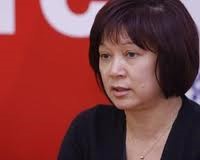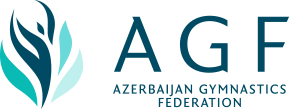- ENG
- AZE
Sport
begins with
gymnastics
News
- The 16th General Assembly of Azerbaijan Gymnastics Federation
- Admission of candidates for membership to the Appeals Commission of Azerbaijan Gymnastics Federation Public Union
- Admission of candidates for membership to the Disciplinary Commission of Azerbaijan Gymnastics Federation Public Union
Arxiv
NELLIE KIM: JUDGING IN GYMNASTICS TURNS INTO PROFESSION
03 February 2014

 Nellie Kim comes to be a frequent guest in Azerbaijan. Having visited Baku at the end of last year for the purpose of acquaintance, the head of the Technical Committee in Women's Artistic Gymnastics of the International Federation (FIG) has held judging courses under the auspices of the FIG recently. And the seminar turned out to be quite saturated. Summing up the results of her visit to Baku, N. Kim shared her impressions of the courses, assessed the prospects' of national judges-beginners and talked about many other things in her interview.
Nellie Kim comes to be a frequent guest in Azerbaijan. Having visited Baku at the end of last year for the purpose of acquaintance, the head of the Technical Committee in Women's Artistic Gymnastics of the International Federation (FIG) has held judging courses under the auspices of the FIG recently. And the seminar turned out to be quite saturated. Summing up the results of her visit to Baku, N. Kim shared her impressions of the courses, assessed the prospects' of national judges-beginners and talked about many other things in her interview.
"Could you please share your impressions of the seminar?"
"Our work was fruitful in whole. Now, we should understand that artistic gymnastics is establishing in Azerbaijan over again, and, therefore, there is a long way ahead in order to achieve world recognition. It also concerns a judging field. You have two experienced judges - Rza Aliyev and Lala Abdullayeva having judging Brevet in other gymnastics disciplines. So, it was a little bit easier for them at the seminar, as they already had an idea of what was expected from a judge. Another participant - Sabina Bashirova had good judging scores and it proved once again that she knew the subject and was able to see mistakes. The period of time when there was no women's artistic gymnastics in your country within twenty years, certainly, had its impact. The workshop's participants have undoubtedly some technical knowledge as many of them were athletes in the past and they speak gymnastics language. But, now, this knowledge should be transformed to paper language as judging is a juridical aspect and each point for an element shall find its reflection on the protocol."
"Probably, each gymnastics discipline has its own judging peculiarities. What can you say about specificities in artistic gymnastics?"
"There are definite requirements during the performance on each apparatus, and, we have them four in total. The Technical Committee in Artistic Gymnastics gives the FIG its recommendations regarding the exercises they would like to see at the competitions. And, athletes have to take all international requirements into account while they construct their program."
"Can we say that you will take the participants who have distinguished themselves in the seminar under your further control?"
"The judges who have successfully proved themselves and who obtain Brevet, enter into the appropriate FIG database. They will get their judge ID number assigned to them in the course of their whole judging career. But, the main test of judges' preparedness is certainly practice which cannot be replaced. So, now everything depends on how they will prove themselves at the competitions."
"Probably, it will take some time for judges-beginners, taken the course and obtained Brevet, to make a name for themselves on the World and European arena. And they do not have international experience when they just begin their judging activity. In your opinion, on which points do they have to work on in order always to be in good form?"
"I know that many judges especially acquire videos of all large-scale tournaments and analyze them. In general, judges' work - is a profession that requires certain abilities, knowledge and effort. I even defended my Candidate's thesis on this subject in St. Petersburg in 2012. A scheme of gymnasts' selection where one of the main criteria are character, knowledge, physical endurance, can fully be applied to the judging board. And, now, we see how it gradually turns into a quite well-paid profession."
"Have you assigned the judges who proved themselves at Baku workshop any homework?"
"Of course! I am a friend of Azerbaijan Gymnastics Federation and I will try to assist as much as I can but the judges have to improve themselves as well. They constantly have to work on it, watch the events' videos and observe the work of foreign judges. In any case, we keep in touch with them and I assign the judges certain tasks which they have to solve. Moreover, the FIG has various computer based programs which significantly assists the judges’ work. So, it is necessary to work and analyze ten exercises per week. They need to have hands-on experience, and, then, it is possible to draw some parallel with a present athlete. For example, if you do not train on a balance beam for a long time, you will stop to feel it. The same story with the judges - perception and assessments should be brought to automaticity."
"You has had a very busy schedule. Did you have an opportunity to walk around Baku?"
"Due to a very busy schedule, I did not have such an opportunity this time. During my last visit, I went to see the city, the National Gymnastics Arena, Athletes' Village for the 2015-European Games. But I have seen here snow this time and it was unique!"
"In your opinion, on what should the Azerbaijani Artistic Gymnastics Team be concentrated this year?"
"The schedule is quite saturated - there are the European and World Championships, Youth Olympic Games, different World Cup series. We have a sea of events. I know you have foreign athletes involved in establishment of the team. But this is a normal practice as you have just started to develop artistic gymnastics in your country. I remember there was a time when five foreigners coming from the former USSR performed within the German national team including your compatriot Valery Belenky. But, now, Germany has its own local athletes without any foreigners involved in the team."
"Coming back to the course, when the judges who officially obtain their international Brevet can begin their activity?"
"This can already take place at the FIG Challenge Cup in Cottbus in March. It is necessary to gain experience, develop skills and it can be done nowhere but at the competitions, as we imply here not only physical form, but also psychological preparation."
